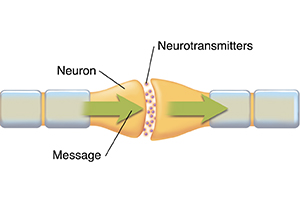Depression and the Brain’s Chemical Balance
Everyone feels sad from time to time. But depression is much more serious than just feeling down. Depression is a real illness just like diabetes or heart disease. Depression is like those diseases because it's not something a person can "snap out of." Experts think that a combination of things causes depression. These include genes, biology, environment, and mental health. Chemical changes in the brain may add to the symptoms of the disease.
Brain chemicals and depression
The brain is a complex organ. It controls all the workings of your body including your emotions. It does this by using messages that travel from one nerve cell to another. Messages also travel from one brain region to another. Brain messages travel with help from chemicals. These are called neurotransmitters. No one knows exactly what happens in the brain to cause depression. But doctors know that neurotransmitters are involved.
 |
| In a normal message pattern, messages travel smoothly between nerve cells in the brain. |
Changes in the brain
Two neurotransmitters are mainly involved in depression. These are norepinephrine and serotonin. Antidepressant medicines and talk therapy are the main treatments for depression. Both change the levels of these neurotransmitters. In many cases, this eases symptoms of depression.
Online Medical Reviewer:
L Renee Watson MSN RN
Online Medical Reviewer:
Marianne Fraser MSN RN
Online Medical Reviewer:
Paul Ballas MD
Date Last Reviewed:
5/1/2022
© 2000-2025 The StayWell Company, LLC. All rights reserved. This information is not intended as a substitute for professional medical care. Always follow your healthcare professional's instructions.